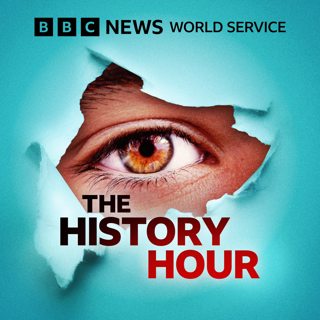
The Americans with Disabilities Act and the invention of GPS
Max Pearson presents a collection of this week's Witness History episodes from the BBC World Service.We find out about the landmark protest in 1990 when wheelchair users crawled up the steps of the US Capitol Building in Washington DC, campaigning for disability rights.Our expert is Dr Maria Orchard, law lecturer at the University of Leeds, who has carried out research into disability and inclusion.We hear about the 2015 attack on the Bardo Museum in Tunisia's capital, in which 22 tourists were killed.Next, the Gambian woman who in 1997 began making bags and purses out of old discarded plastic and is now globally recognised as Africa's Queen of Recycling.The South African musical King Kong which opened to critical acclaim in 1959 and whose all-black cast defied apartheid.Finally, the invention of the Global Positioning System - GPS - in the late 1970s, which now keeps aircraft in the sky and supports banking transactions.Contributors:Anita Cameron - disability rights campaigner Dr Maria Orchard - lecturer in law at the University of Leeds Hamadi Ben Abdesslem - tour guide Isatou Ceesay - environmental campaigner Nelson Mandela - former President of South Africa Marian Matshikiza - daughter of Todd Matshikiza, jazz pianist and composer Professor Brad Parkinson - chief architect of GPS(Photo: 8 year-old Jennifer Keelan crawls up the steps of the US Capitol, 12 March 1990. Credit: AP/Jeff Markowitz)
15 Mars 51min

The invention of the shopping trolley and the Calais 'Jungle'
Max Pearson presents a collection of the week’s Witness History interviews from the BBC World Service.We find out how Sylvan Goldman’s invention of the shopping trolley in 1930s America turned him into a multi-millionaire.Our expert is Rachel Bowlby, Professor of Comparative Literature at University College London, who is also the author of two books on the history of shopping.We hear about Toyota’s military pick-up trucks that transformed the 1987 north African conflict between Chad and Libya.The 2015 migrant crisis in Europe which led to thousands of people setting-up camp in the French port of Calais.Next, how US forces invaded the Central American state of Panama in 1989 to depose General Manuel Noriega.And finally in 1965 at the height of the USA’s civil rights struggle, the landmark legislation that was brought in to guarantee the rights of African Americans to vote.This programme contains outdated language which some people might find offensive.Contributors: Charles Kuralt – a journalist for CBS News Sylvan Goldman – inventor of the shopping trolley Rachel Bowlby - Professor of Comparative Literature at University College London Mahamat Saleh Bani - former officer in the Chadian Armed Forces Enrique Jelenszky – lawyer Jean-Marc Puissesseau - former President and Chairman of the Port of Calais C T Vivian – US minister George Wallace – former Governor of Alabama Lyndon B Johnson – former President of the United States(Photo: A woman pushing a shopping cart, 1949. Credit: Bettman via Getty Images)
8 Mars 50min

Discovering the haemoglobin structure and the Nellie massacre
Max Pearson presents a collection of the week’s Witness History interviews from the BBC World Service.We hear about the moment Dr Max Perutz discovered the haemoglobin structure.Our expert is Professor Sir Alan Fersht, who is a chemist at the Medical Research Council Laboratory of Molecular Biology and knew Dr Perutz personally.We also hear about 22 Inuit children from Greenland's indigenous population who were sent to Denmark as part of a social experiment in 1951.Also, when mixed-raced children from the then Belgian Congo known as ‘métis’, were forcibly taken from their homes in 1953.When an eruption of violence in Assam led to an estimated 3,000 being killed in the Nellie massacre of 1983.Finally, the devastating impact of the 2010 tsunami in Chile and a woman who survived it.This programme contains outdated language which some people might find offensive.Contributors: Lectures and programmes from the BBC archive Professor Sir Alan Fersht - chemist at the Medical Research Council Laboratory of Molecular Biology. Helen Thiesen - a child in Denmark's Inuit children social experiment. Marie-José Loshi - one of the mixed-race ‘métis’ who was forcibly removed from her home in the then Belgian Congo. Bedabrata Lahkar - a journalist for the Assam Tribune newspaper at the time of the Nellie massacre. Alison Campbell - a survivor of Chile’s 2010 tsunami.(Photo: Dr Max Perutz and Dr Paul Kedrew. Credit: Hulton Deutsch/Contributor via Getty Images)
1 Mars 51min

Death of a language and the world’s longest kiss
Max Pearson presents a collection of the week's Witness History interviews from the BBC World Service.We hear about the death of one of the oldest languages in the world, when an 85 year old woman died and took it with her in 2010.Our expert guest is Dr Mandana Seyfeddinipur, who is the Head of the Endangered Languages Archive which endeavours to preserve languages that are disappearing at “an alarming rate.”We also hear about the historian who helped bring a former Stasi officer to justice decades after he killed a man.Also the moment Bolivia elected its first ever indigenous president in 2005.The Thai couple that broke the world record for the longest kiss twice.Plus, it’s 60 years since the controversial black activist, Malcolm X was assassinated. We hear from a man who was in the audience in New York when it happened.This programme contains outdated and offensive language.Contributors: Dr Anvita Abbi – linguist who documented one of the oldest languages before it died Dr Mandana Seyfeddinipur – Head of the Endangered Languages Archive Dr Filip Gańczak – the historian who helped convict a former Stasi officer of murder Herman Ferguson who was in the audience when Malcolm X was assassinated Álvaro García Linera – Vice President of Bolivia under Evo Morales for 14 years Ekkachai – one half of the couple who broke the record for the world’s longest kiss(Photo: Boa Senior in Hospital. Credit: Anvita Abbi)
22 Feb 51min

Great speeches from around the world
Max Pearson presents a collection of the week's Witness History interviews from the BBC World Service. We discuss the 1992 speech given by Australian Prime Minister, Paul Keating, in which he acknowledged the moral responsibility his government should bear for the horrors committed against Indigenous Australians, with our guest Dr Rebe Taylor from Tasmania University.We also look at two female orators from opposite ends of the political spectrum: Eva Peron, also known as Evita, from right-wing Argentina and Dolores Ibárruri, who was a communist and anti-fascist fighter in the Spanish Civil War. There are also two speeches from the USA, one which is remembered as one of the great presidential speeches of all time and another which help to change the view of AIDS in the country.Contributors: Don Watson - who wrote Paul Keating's Redfern speech in 1992.Dr Rebe Taylor - Australian historian from the University of Tasmania.Archive of Eva Peron - former first lady of Argentina. Mary Fisher - who addressed the Republican Party convention in 1992.David Eisenhower and Stephen Hess - Dwight Eisenhower's grandson and former speechwriter.Archive of Delores Ibárruri - former anti-fascist fighter in the Spanish Civil War.(Photo: Paul Keating Credit: Pickett/The Sydney Morning Herald/Fairfax Media via Getty Images)
15 Feb 51min

Cult films and a 'rockstar' philosopher
Max Pearson presents a collection of the week's Witness History interviews from the BBC World Service. Our guest is film critic and journalist Helen O'Hara who dissects what makes a cult film classic, after we hear about the making of the 1989 American film Heathers.We also learn about the French philosopher behind the theory of deconstruction and how the world first became aware of coral bleaching in the 1980s. As the climax of the American Football season approaches we look back at one of the most memorable moments from Super Bowl history. Contributors: Lisanne Falk - American star of the film Heathers.Helen O'Hara - film critic and journalist. Helene Cixous - lifetime friend of French philosopher Jacques Derrida.Agathe Hébras - granddaughter of Robert Hébras, survivor of the Oradour Massacre. Clive Wilkinson - the former co-ordinator for the Global Coral Reef Monitoring Network.Osi Umenyiora - two-time Super Bowl winner with the New York Giants.(Photo: Winona Ryder, Kim Walker, Lisanne Falk, and Shannen Doherty on the set of Heathers 1988, New World Pictures/Getty Images)
8 Feb 50min

The 'Wolf Children' of World War Two and China's TV lessons
We hear from 'wolf child' Luise Quietsch who was separated from her family and forced to flee East Prussia. Whilst trying to survive during World War Two, these children were likened to hungry wolves roaming through forests. Journalist and documentary film-maker Sonya Winterberg who recorded the testimony of “wolf children” for her book, discusses the profound impact it had on their lives. We also hear about the first major series of English lessons which were broadcast on Chinese television in 1981. Kathy Flower presented the English education programme, Follow Me, several times a week at primetime. It was watched by an estimated 500 million people keen to get a taste of the English language and observe westerners on television. Kathy Flower recalls what it was like becoming the most famous foreign person in China.A series of unprecedented teachers’ strikes temporarily shut most of New York’s schools in the late 1960s, provoked by an ongoing dispute over whether parents could have a say in the running of their children’s schools. Monifa Edwards was a pupil at a school in the district of Ocean Hill-Brownsville, a name that became synonymous with the struggle over who controlled the local schools: the communities or the mainly white city officials.On 16 March 1988, loyalist paramilitary Michael Stone killed three mourners and injured 60 others attending a funeral for IRA members killed in Gibraltar. American journalist Bill Buzenberg, who was covering the funeral for National Public Radio in the US, was knocked off his feet in the gun and grenade attack.Finally we head to Eastern Europe in 1989, where approximately two million people joined hands across across Estonia, Latvia and Lithuania to form a human chain demanding independence from the Soviet Union. It was a key moment in the protests in Eastern Europe that became known as the Singing Revolution. In 2010, Damien McGuinness spoke to MEP Sandra Kalniete, a Latvian organiser of the event.(Photo: Luise Quietsch. Credit: Rita Naujokaitytė)
1 Feb 51min

Back to 1995
Max Pearson presents a collection of the week’s Witness History episodes, all about events which happened in 1995. First, we hear how Microsoft launched Windows 95 after a $300 million marketing campaign. Our expert guest is Dr Lisa McGerty – Chief Executive of the Centre for Computing History in Cambridge.Next, after 17 years terrorising America, we hear about the hunt for the Unabomber. Plus, the sarin gas attack on a Tokyo metro, carried out by members of a doomsday cult.Finally, how China exerted its influence over Tibetan Buddhism’s leadership. Contributors: Sarah Leary – project manager for Microsoft.Dr Lisa McGerty – Chief Executive of the Centre for Computing History.Carmine Gallo – police officer.Dr Kathleen Puckett – FBI agent.Atsushi Asakahara – metro passenger.Arjia Rinpoche – senior Tibetan Lama.(Photo: People lined up by US Microsoft Windows 95 exhibit. Credit: Forrest Anderson/Getty Images)
25 Jan 50min





















